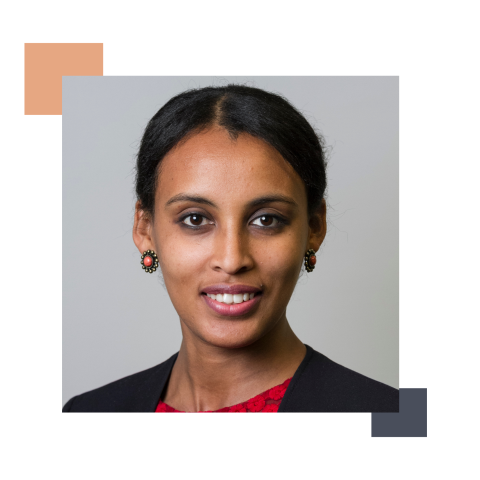
Tsion Minas, Ph.D.
Tsion Minas, Ph.D., a molecular epidemiologist, is a recent recipient of a Fulbright U.S. Scholar Award. She joined the Laboratory of Human Carcinogenesis in 2016 to work with Senior Investigator Stefan Ambs, Ph.D., M.P.H., and study the molecular nature of cancers in African populations. In this Q&A, she shares her passion for closing disparity gaps in health research and how she plans to build upon her Fulbright work in the future.
What sparked your interest in cancer and health disparities research?
My interest in this area of study was triggered when I was completing my Ph.D.— we were designing a drug that targets a genetic change (translocation of DNA bases) that occurs in prostate cancer. But I learned that the genetic abnormality is found almost exclusively in the prostate tumors of European Americans and not African Americans. That gave me some insight — here we are designing a drug and it's not going to be effective for African Americans. That was an “aha” moment for me. I saw how disparities in research could actually end up creating a gap in healthcare.
If we don’t study the mechanism of disease progression and the different molecular changes involved in wide-ranged populations, it's going to end up creating a bigger gap down the road. As someone born in Ethiopia, I come from a population that is underrepresented in cancer research, and I have always been interested in addressing these problems. That’s why I specifically looked for labs for my postdoctoral training that were doing health disparities research, and that’s how I ended up in Dr. Stefan Ambs’ lab. It was the perfect fit for me.
Tell us about your research at CCR.
My background is in molecular biology and biochemistry, so I wanted to bring that work into disparities research. This involves taking serum samples and tumor samples to study their biological contribution to health disparities.
When I joined Dr. Ambs’ lab, there was already a big prostate cancer case-control study underway that had about 2,000 African American and European American people in it, with biological samples already collected. But I was also interested in doing more research in Africa, so during my postdoctoral training, we began collaborating with Dr. Michael Cook on the NCI-Ghana study and Dr. Clayton Yates, co-director of the Transatlantic Prostate Cancer Consortium. It is through this collaboration that we were able to investigate the biological underpinnings of prostate cancer disparities using thousands of samples from Nigeria and Ghana, in addition to the African American and European American samples that we already had in the lab.
For the Fulbright grant, I will be using the skills I have developed during my postdoctoral training to investigate why human papillomavirus (HPV) infection is spontaneously cleared in most women but persists in others, increasing their risk for cervical cancer.
What does it mean to you to be a recipient of a Fulbright Award?
It is an honor. Globally, there are huge cervical cancer disparities where the majority of the cases occur in developing countries, such as Ethiopia. The Fulbright U.S. Scholar award will allow me to contribute my part in addressing this gap through my research, teaching and outreach.
Also, as one of the few programs that support U.S. scientists to conduct research internationally, the Fulbright U.S. Scholar award will allow me to establish a long-lasting partnership with researchers abroad and a cervical cancer research program in Ethiopia, which will be instrumental as I apply for a large research grant.
How do you want to shape the future landscape of cancer research?
The inherent cellular diversity and complex causes of most cancer types underscore the need to include wide-ranged populations in cancer research. Then, and only then, we can get a more complete picture of the disease, which will help us to understand, prevent and treat cancer effectively in all populations. However, one of the challenges is that there are not that many biological samples available from Africa in existing biorepositories compared to other parts of the world. Through the Fulbright award, I hope to generate a well-annotated biorepository of high-quality biological samples to be able to do the kind of research that I want to carry out.
What advice do you have for women and people of color interested in pursuing a career in STEM?
It’s a tough road, but my advice is to persist. Always follow your passion – when you are passionate about your goal, you will find a way around the obstacles. Also, remember that there’s no singular set path to get to your goal—you can carve out your own path and that’s absolutely fine.